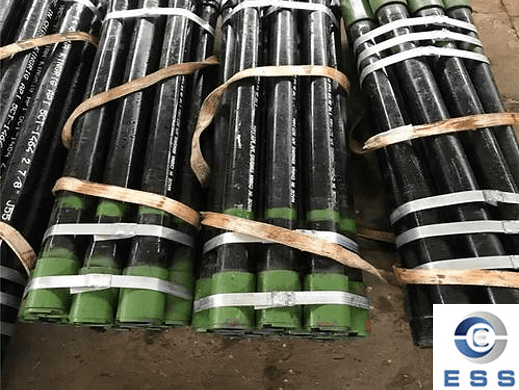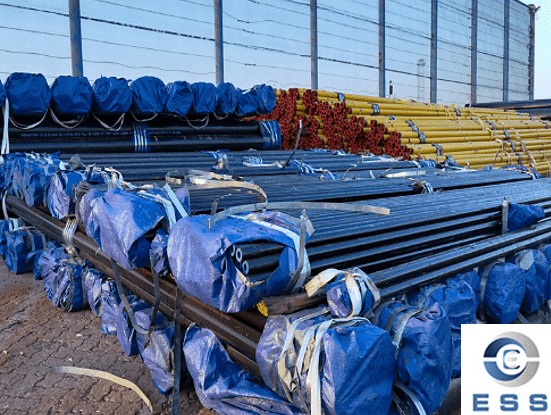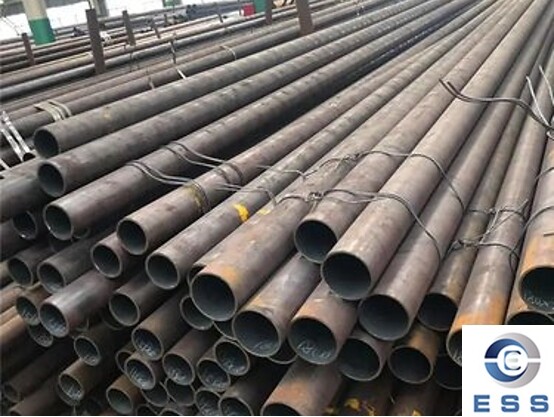
Pup Joints Material Grades:
J55 and L80
Pup joints are short pipe sections used in
oil and gas drilling to precisely adjust the length of casing pipe and tubing strings. The American Petroleum Institute (API) specifies
standardized material grades to provide the required strength and pressure
resistance. The two most commonly used grades are J55 and L80, corresponding to
minimum yield strengths of 55,000 psi and 80,000 psi, respectively.
J55 Pup Joints
1. Material Properties
Yield Strength: J55 steel grade indicates
that the pup joint material has a minimum yield strength of 55,000 psi, in
compliance with API standards.
Material: J55 is a medium-strength carbon
steel alloy commonly used in the manufacture of oil country tubular goods (OCTG), such
as casing. It offers a combination of strength, toughness, and
cost-effectiveness.
Manufacturing Process: These are
manufactured from hot-rolled or electric resistance welded (ERW) J55 steel and
are available in a variety of outer diameters.
2. Advantages
J55 pup joints offer a basic, low-cost
joint configuration that easily connects to J55 fittings or other matching
fittings while meeting basic performance requirements.
J55 offers excellent ductility compared to
higher-grade steels, improving resistance to shock and impact during
installation.
It is also less susceptible to
hydrogen-induced cracking, which can lead to catastrophic failure.
The medium-strength grade allows for
greater flexibility in storage, handling, and rig operation.
3. Applications
J55 pup joints are typically used in
shallow to medium-sized wells or low-pressure applications where strength is
less critical.
L80 Pup Joints
1. Material Properties
Yield Strength: The L80 pup joint material
grade indicates a minimum yield point of 80,000 psi (in compliance with API
specifications), a 45% improvement over J55.
Alloy Composition: Chromium, molybdenum,
and other elements are added to enhance strength and corrosion resistance.
Manufacturing Process: The fine-grained
microstructure produced by the Thermomechanical Control Process (TMCP)
maximizes the strength of the L80 pup joint.
2. Advantages
With approximately 45% greater strength
than the J55, the L80 can withstand higher internal pressures, tensile loads,
and burst forces, meeting demanding application requirements.
The L80's thinner wall allows for a larger
inner diameter for production.
L80's excellent toughness at low
temperatures effectively prevents cracking.
L80's excellent corrosion resistance
extends service life and reduces maintenance costs.
3. Applications
The L80 pup joint is suitable for
medium-depth well sections under 10,000 feet, where higher strength is required
under high-temperature and high-pressure conditions. The L80 provides excellent
performance where higher loads and pressures are expected.
4. Precautions
The L80 pup joint must be handled and
stored with care to avoid dents or other mechanical damage that could
compromise its integrity. Installation procedures should minimize thread
scoring or scratching.
J55 Pup Joints vs. L80 Pup Joints
|
Comparison Items
|
J55 Pup Joints
|
L80 Pup Joints
|
|
Yield Strength
|
55,000 psi (379 MPa)
|
80,000 psi (552 MPa)
|
|
Cost
|
Lower
|
Higher
|
|
Applicable Well Depths
|
Shallow to Medium Wells
|
Medium to Deep Wells
|
|
Corrosion Resistance
|
Fair, not suitable for sour environments
|
Good, optional L80-13Cr for corrosion
resistance
|
|
Toughness
|
Good, strong ductility
|
Excellent, improved crack resistance
|
|
Typical Applications
|
Conventional oil and gas wells,
low-pressure wells
|
High-temperature and high-pressure wells,
wells with corrosive media
|
The primary trade-off between the J55 and
L80 pup joints is strength versus cost.
1. Strength
The J55 pup joints offer acceptable
ductility, while the L80 offers excellent toughness in high-strength
applications.
The L80 pup joints' excellent corrosion
resistance extends service life and reduces long-term replacement and
maintenance costs.
2. Cost
The J55 pup joint is 20-30% less expensive
due to its lower alloy content, simpler manufacturing process, and more relaxed
operating standards. It may be suitable for shallower, less demanding well
conditions.
In contrast, the L80 pup joint, due to its
different alloy composition and processing, is more expensive, but it can
accommodate deeper, higher-pressure well designs.
When selecting the optimal pup joint grade
for a specific wellbore trajectory and service life requirements, operators
must balance these factors with budget.
How to Select the Appropriate Pup Joint
Material Grade
In actual projects, the decision between
the J55 and L80 pup joints depends on a comprehensive consideration of the
following factors:
1. Well Depth and Pressure
The deeper the well and the higher the
pressure, the more demanding a higher-strength grade (such as L80) is.
2. Environmental Corrosivity
When working with sour gases such as H₂S or CO₂, L80 or higher
grades (such as P110) are preferred.
3. Cost Budget
For budget-sensitive projects with milder
operating conditions, the J55 pup joint is a more economical choice.
4. Wellbore Life Design
If long-term operation and reduced
maintenance costs are required, the L80, with its superior corrosion
resistance, should be preferred.
FAQ
1. What Are The API 5CT Requirements for
Pup Joints?
According to the API 5CT standard, pup
joints should use the same material grade and thread type (e.g., LTC, STC, BTC)
as the casing or tubing and undergo necessary non-destructive testing (NDT) to
ensure mechanical and sealing properties.
2. Are J55 And L80 Pup Joints Interchangeable?
Direct interchange is generally not
recommended.
The pup joints must match the material
grade of the casing or tubing. Failure to do so will result in inconsistent
connection strength, reduced pressure-bearing capacity of the entire string,
and even downhole failure.
Conclusion
The J55 pup joint is economical and
practical, suitable for shallow and medium-sized wells, and non-corrosive
environments. The L80 pup joint offers greater strength and corrosion
resistance, making it suitable for deep wells, high-pressure conditions, and
conditions involving corrosive media. Correct selection of the pup joint
material grade can ensure the safety, economy and wellbore integrity of
drilling operations, and is a crucial link in oil and gas production.













 Eastern Steel Manufacturing Co.,Ltd not only improve product production and sales services, but also provide additional value-added services. As long as you need, we can complete your specific needs together.
Eastern Steel Manufacturing Co.,Ltd not only improve product production and sales services, but also provide additional value-added services. As long as you need, we can complete your specific needs together.










